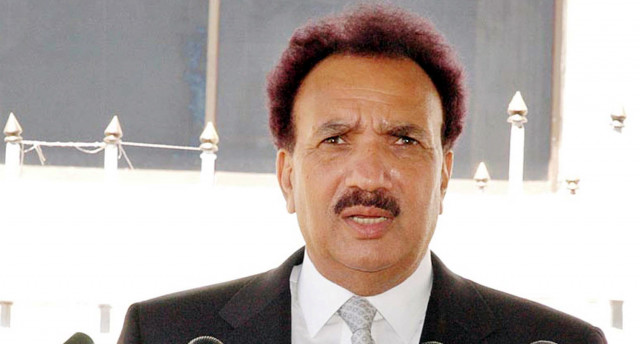Govt looks to toughen up with new anti-terror law

This latest dose of empowerment for law enforcement personnel came in the shape of the Anti-Terrorism (Amendment) Bill 2010 which was tabled in the upper house of parliament on Tuesday. The bill was moved to the upper house by Interior Minister Rehman Malik, who called for suspending the rules to immediately take up the bill, stressing the urgency of turning it into a law.
The proposed bill seeks to amend the Anti-Terrorism Act (ATA) 1997. It recommends travel curbs on proscribed organisations whose leaders and workers will neither be able to obtain passports nor will they be allowed to leave the country.
No bank or financial institution will be allowed to provide them financial assistance, loans or credit cards. Their arms licences will also be revoked.
Jail terms for those involved in terror acts will be enhanced from 7 years to 10 years. Offenders will also face forfeiture of property.
The government will have the power to issue orders for preventive detention of up to 90 days in connection with investigation of a person suspected of involvement in any offence under this act or if any reasonable complaint had been lodged against him or a credible information or evidence received about his involvement in the offence. These orders would not be challenged in any court of law.
The proposed legislation also empowers the federal government to trace or tape telephone calls of any person suspected of terror links. Police will have the authority to summon any person during the investigation process for obtaining information. According to an amendment in sub-section 6 of Clause 2, the words intimidating and terrorising the public, social sector, business community and preparing and attacking civilians, government officials, installations, security forces or law enforcement agencies shall be added.
Under sub-section 2 of Clause 2, any person possessing illegal explosive material or having illegal links with explosives will also fall within the ambit of terrorism.
Any person found involved in the armed struggle against law-enforcement agencies at individual and group levels or anyone disseminating or preaching his creeds or beliefs through FM radio stations without government approval will also be proceeded against under this act.
According to an amendment to section 7 of the Anti-Terrorism Act No 27 of 1997, any person convicted under this act or found involved in a case of kidnapping for ransom or hijacking shall face rigorous imprisonment extending up to 10 years or more and will be liable to forfeiture of property.
An amendment to section 11 of the ATA has been proposed which says that no outlawed organisation will be authorised to operate under a new nomenclature or in the name of a new organisation . Any subordinate organisation will be deemed proscribed on the suspicion of having been involved in activities like those of outlawed outfits. The government will issue a formal notification for imposition of a ban on it.
A person found involved in acts of terror would be investigated by a police officer not less than the rank of sub-inspector. The detainee would be produced within 24 hours in a closed-door anti-terrorism court.
FM radios found involved in promoting terrorists or terror activities would also be dealt with under terrorism charges. It has been suggested in Section 21(d) that no court will grant bail to a person found involved in terrorism and anyone committing the offence under this act punishable with death or imprisonment for life or imprisonment exceeding 10 years.
Senators seek debate
The interior minister said the anti-terror bill was critical in view of the escalating threat of terrorism and repeated attacks on the armed forces, law-enforcement agencies, hotels, as well as civil and government offices and installations. More stringent laws are needed to crush terror attacks and award punishment to those found involved in such attacks, he said.
Opposition Senator Prof Ibrahim objected to Malik’s assertion. Since the bill relates to the country’s future, it should be discussed threadbare at the house committee on interior affairs, he said. Senators Safdar Abbasi and Shahid Bugti also supported Ibrahim’s viewpoint.
Malik then agreed with notions of the members though he requested the chairperson to set a timeframe for deliberations and bring the bill back to the House. After evolving a consensus, acting Senate chairman Mir Jan Jamali referred the bill to the standing committee with instructions to complete deliberations by Friday and bring the bill to the house by Monday so it could be discussed during the next three days.
Published in The Express Tribune, July 28th, 2010.



















COMMENTS
Comments are moderated and generally will be posted if they are on-topic and not abusive.
For more information, please see our Comments FAQ